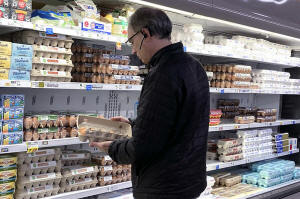US inflation cooled last month, though trade war threatens to lift
prices
[March 13, 2025] By
CHRISTOPHER RUGABER
WASHINGTON (AP) — U.S. inflation slowed last month for the first time
since September and a measure of underlying inflation fell to a
four-year low, even as widespread tariffs threaten to send prices
higher.
The consumer price index increased 2.8% in February from a year ago,
Wednesday’s report from the Labor Department showed, down from 3% the
previous month. Core prices, which exclude the volatile food and energy
categories, rose 3.1% from a year earlier, down from 3.3% in January.
The core figure is the lowest since April 2021.
The declines were greater than economists expected, according to a
survey by data provider FactSet. Yet inflation remains above the Federal
Reserve's 2% target. And most economists expect inflation will remain
elevated this year as Trump's tariffs kick in.
The report “is encouraging news, though it doesn’t tell us much about
where inflation is headed,” said Oren Klachkin, Nationwide Financial
Markets economist, in an email. “With tariffs possibly set to push goods
prices higher ... we see inflation risks as tilted to the upside.”
On a monthly basis, inflation also came in much lower than expected.
Consumer prices rose 0.2% in February from the previous month, down from
a big 0.5% jump in January. And core prices rose just 0.2%, below the
0.4% increase in January. Economists watch core prices because they are
typically a better guide to inflation's future path.
A sharp drop in air fares, which fell 4% just in February from the
previous month, helped bring down overall inflation. Rental price
increases also slowed and the costs of hotel rooms and car insurance
rose much more slowly in February than the previous month. The price of
new cars fell last month compared with January.

Grocery prices were unchanged last month from January, bringing some
relief to consumers grappling with a 25% jump in grocery prices from
four years ago. The cost of eggs, however, jumped 10.4% in February from
the previous month and are nearly 60% more expensive than a year ago.
Avian flu has forced farmers to slaughter more than 160 million birds,
including 30 million in January. Average egg prices hit $5.90 a dozen
nationwide in February, a record high. The price had consistently been
below $2 a dozen for decades before the disease struck.
How big an impact Trump's tariffs will have on prices remains unclear,
for now. The duties have roiled financial markets and could sharply slow
the economy, and some analysts see the odds of a recession rising.
On Wednesday, Trump raised U.S. import taxes on all steel and aluminum
imports to 25% each. Some companies that use steel are already seeing
their costs rise, and depending on how long they stay in place, they
could lift prices for cars, appliances, and electronics. The European
Union responded in kind almost immediately to the steel and aluminum
duties, announcing retaliatory trade action with new tariffs on U.S.
industrial and farm products.
[to top of second column] |

A shopper checks eggs before he purchases at a grocery store in
Glenview, Ill., Tuesday, Jan. 10, 2023. (AP Photo/Nam Y. Huh, File)
 The White House has also imposed 25%
duties on all imports from Canada and Mexico, with a 10% rate for
oil from Canada. Most of those tariffs have been suspended until
early April.
However, Canada will announce retaliatory tariffs that add up to $21
billion in U.S. dollars, according to a senior Canadian government
official who spoke on condition of anonymity because they weren’t
authorized to speak before the announcement.
Trump has also pledged to impose reciprocal tariffs on any country
with duties on U.S. exports on April 2. Economists at the Yale
Budget Lab calculate that those duties could boost the average U.S.
tariff rate to its highest level since 1937, and cost the average
household as much as $3,400.
That has sent business owners scrambling.
“It does put a lot of businesses like ours in a tough spot,” said
Ethan Frisch, co-CEO of the New York spice company Burlap & Barrel.
“We’re going to have to pass along (the cost) to the consumer. We
can’t afford to eat that cost ourselves as a small business. And we
certainly can’t pass it back to a farmer in central Mexico. So, it’s
going to make the product more expensive, which is then in turn
going to slow down sales.”
Performance expectations for 2025 have already been moderated by
some of the largest U.S. retailers.
Walmart CFO John David Rainey said last month that some product
categories will have price increases.
Last week, Target CEO Brian Cornell said produce prices, including
Mexican avocados, could rise soon industrywide and prices for other
goods are likely to follow. Best Buy’s CEO Corie Barry said she's
expecting higher prices from suppliers, with China and Mexico being
primary sources for its products.
Tariffs were a big topic at the recent annual Toy Fair as nearly 80%
of the toys sold in the U.S. are sourced from China. Price increases
of 15% to 20% are expected on games, dolls, cars, said Greg Ahearn,
president and CEO of The Toy Association, said
____
AP Writers Josh Boak and Paul Wiseman in Washington, Anne
D'Innocenzio in New York, and Lorne Cook and David McHugh in Europe,
contributed to this report.
All contents © copyright 2025 Associated Press. All rights reserved
 |